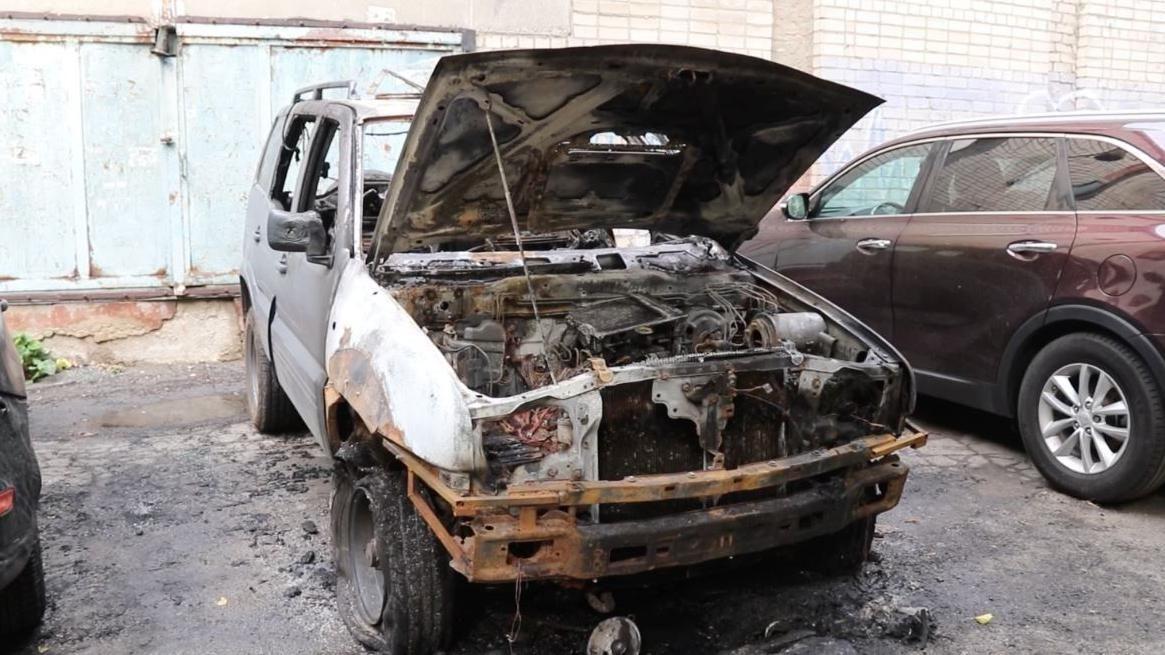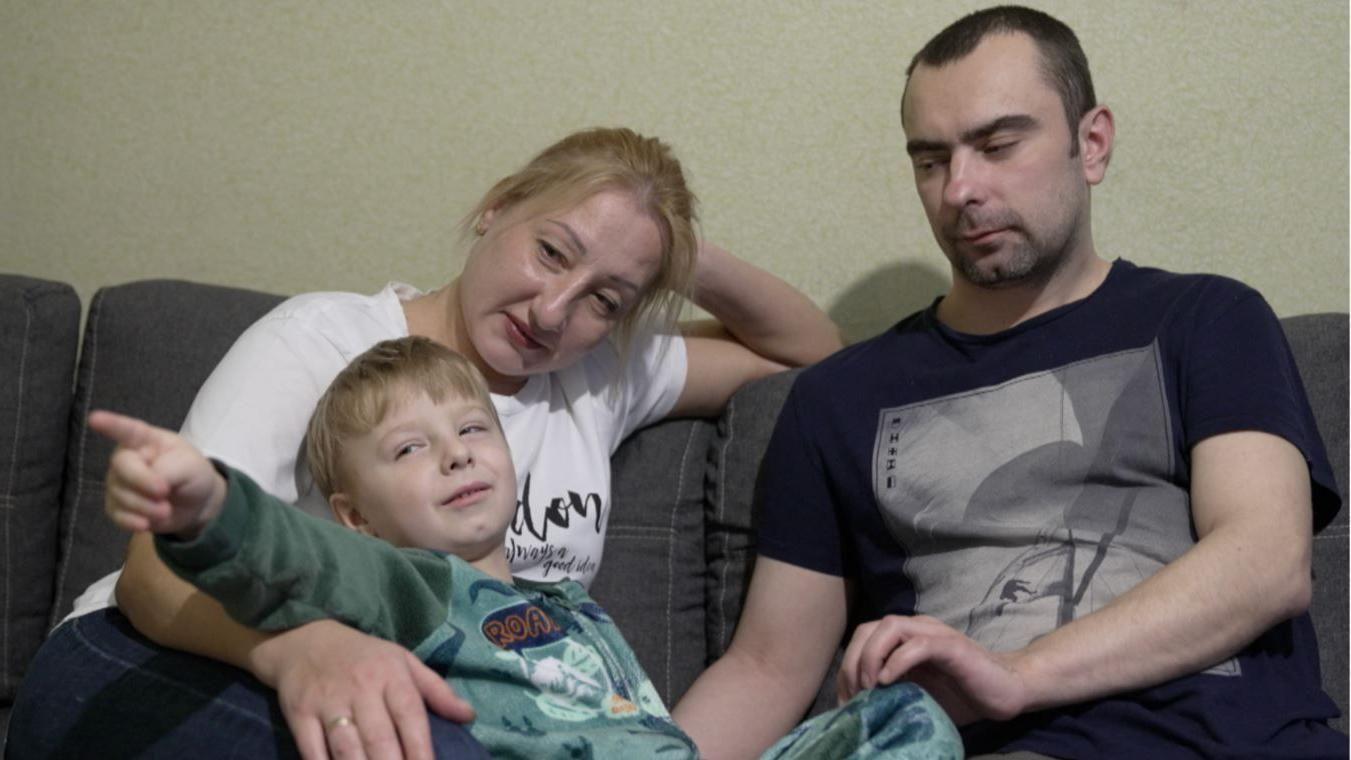Svetlana says that she never considered the possibility of betraying her native country, “not even for a second”.
“My husband would never forgive me,” she says, when we meet in her apartment near Kiev.
This 42-year-old woman had been waiting for news about her husband Dima, a military medic captured in Russia, for more than two years, when she suddenly received a phone call.
The voice on the other end of the line told her that if she committed treason against Ukraine, Dima could be entitled to better treatment in prison or even early release.
“I was called by a Ukrainian number. I called, and the man introduced himself as Dmitri,” explains Svetlana.
“He spoke with a Russian accent.”
“He said, ‘You can burn down a military recruitment office, set fire to a military vehicle, or sabotage a Ukrainian railway junction box.’
There was another option: to reveal the locations of nearby air defense units – vital military assets that keep Ukraine’s skies safe from Russian drones and missiles.
As Dmitri presented his proposal, Svetlana says she remembered the instructions Ukrainian authorities gave to all families in case they were approached by Russian agents: delay as long as you can, record and photograph the entire conversation, and report it at the end.
Svetlana did report it and took screenshots of the messages, which she showed to the BBC.
Ukraine’s Security Service (SBU) told her that she was “fooling” the Russians until they investigated the case.
And that’s why Svetlana agreed to throw a firebomb on the local railway line.
‘Your husband is being tortured now and it’s your fault’
As we sit with her in her spotless living room, air raid sirens wailing periodically outside, she plays me recordings of two voice conversations she made with Dmitri on the phone, conducted via the Telegram app.
During the call, he instructs her on how to make and set up a Molotov cocktail.
“Pour a liter of gasoline for lighters and add some real gasoline,” explains Dmitri.
“Go to any railroad crossing. Make sure there are no security cameras. He wears a hat – just in case.”
He also taught Svetlana how to put her phone on airplane mode when she was a kilometer or two away from the intended target, in order to avoid her signal being registered by a cell phone tower and that information being used in the investigation.

“Do you know what a junction box is? Take a picture of her. That should be the target of your firebomb attack,” Dmitri explained to her, looking for proof that the task had been completed.
“Write today’s date on a piece of paper and take a picture with that paper.”
In return, Dmitri said, he would be able to arrange a telephone conversation with her husband or arrange for a package to arrive from her.
Later, the SBU told Svetlana that the man she was talking to was indeed in Russia and that she should stop all contact with him.
Svetlana told Dmitri that she had changed her mind.
“That’s when the threats started,” says Svetlana.
“He said he would kill my husband and I would never see him again. He called me for days and said: ‘Your husband is being tortured now, and it’s your fault.'”
“How worried were you that he might carry out his threats to harm Dima,” I ask Svetlana.
Her eyes watered.
“My heart ached and I could only pray: ‘God, please don’t let this happen.'”
“A part of me was saying, ‘This person has nothing to do with prisoners.’ Another part of me wondered: ‘What if he could really do it? How will I live with myself?'”
In a statement to the BBC, the SBU said that cooperation with Russian agents “will in no way ease the suffering of prisoners; on the contrary, it could even significantly complicate his chances of being traded.”
The authorities call on all relatives to come forward immediately if they are contacted by Russian agents.
Those who do, they say, will be “protected” and treated as victims.
But if relatives agree to commit sabotage or espionage, the SBU says, “it could be classified as treason.” The maximum penalty is life imprisonment.”
The authorities regularly make public the arrests of Ukrainians who allegedly set fires or revealed the locations of military positions to Russia.
Media close to the Kremlin are full of footage claiming to show Ukrainians setting fire to military vehicles or railway junction boxes.
Some of the perpetrators do it for money, which is paid to them by suspected Russian agents, but it is believed that these attacks are also carried out by desperate relatives.

Petro Yatsenko, from the Ukrainian army headquarters for the treatment of prisoners of war, says that Russian agents have contacted about 50 percent of all families of prisoners of war.
“They are in a very vulnerable position and some of them are ready for anything,” says Petro, “but we are trying to educate them that this will not help their loved ones in captivity.”
Petro says that an act such as setting fire to a military vehicle is not considered a significant material loss for the Ukrainian Armed Forces:
“But it can destabilize the unity of Ukrainian society, so it’s a big problem. And, of course, if someone discovers the location of, for example, an air defense system, that’s a big problem for us too,” he admits.
The authorities do not release the number of Ukrainians held as prisoners of war, but it is believed to be more than 8,000.
A Ukrainian intelligence source told the BBC that the number of cases where relatives agreed to cooperate with the Russians was very small.
The Russian government told the BBC in a statement that accusations that it was using prisoners’ families for blackmail were “baseless” and that Russia was treating “Ukrainian fighters humanely and in full compliance with the Geneva Convention”.
In the statement, Ukraine is accused of using the same methods:
“Ukrainian recruiters are actively trying to entice Russian residents to commit acts of sabotage and arson on Russian territory, targeting key infrastructure and civilian facilities.”

Svetlana’s husband Dima was released from captivity a little over three months ago.
The couple is now back together and enjoying playing with their four-year-old son Vov.
How did Svetlana feel when her husband was finally released?
“I had tears of joy like never before,” she says beaming.
“I felt as if I had plucked my love from the jaws of death.”
Dima told the woman that the Russians had not fulfilled their threats to punish him if she refused to cooperate.
When Svetlana told him about the calls, he was shocked.
“He asked me how I endured it
“I told him, as I always say, that I am, after all, an officer’s wife,” she says with a wink.
Follow us on Facebook, Twitter, Instagram, YouTube i Wayberu. If you have a topic suggestion for us, please contact bbcnasrpskom@bbc.co.uk

News
Source: www.vijesti.me


